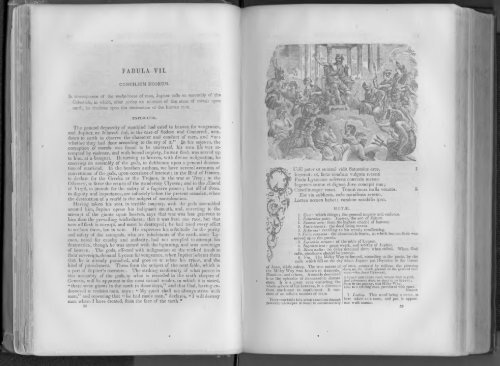THE METAMORPHOSES OF PUBLIUS OVIDIUS NASO
THE METAMORPHOSES OF PUBLIUS OVIDIUS NASO
THE METAMORPHOSES OF PUBLIUS OVIDIUS NASO
Create successful ePaper yourself
Turn your PDF publications into a flip-book with our unique Google optimized e-Paper software.
TABULA VII.<br />
CONCILIUM DEORUM.<br />
In consequence of the wickedness of men, Jupiter calls an assembly of tha<br />
Celestials, in. which, after giving an account of the state of morals upon<br />
earth, he resolves upon the destruction of the human race.<br />
EXPLICATIO.<br />
The general depravity of mankind had cried to heaven for vengeance,<br />
and Jupiter, as Jehovah did, in the case of Sodom and Gomorrah, went<br />
down to earth to observe the character and conduct of men, and "see<br />
whether they had done according to the cry of it." Jn his sojourn, the<br />
corruption of morals was found to be universal, his own life was at<br />
tempted by violence, and with horrid impiety, human flesh was served up<br />
to him, at a banquet. Returning to heaven, with divine indignation, he<br />
convenes an assembly of the gods, to deliberate upon a general destruc<br />
tion of mankind. In the heathen authors, we have several accounts of<br />
conventions of the gods, upon occasions of interest; in the Iliad of Homer,<br />
to declare for the Greeks or the Trojans, in the war at Troy ; in the<br />
Odyssey, to favor the return of the wandering Ulysses ; and in the ^Eneid<br />
of Virgil, to provide for the safety of a fugitive prince ; but all of them,<br />
in dignity and importance, are infinitely below the present occasion, when<br />
the destruction of a world is the subject of consideration.<br />
Having taken his seat, in terrible majesty, with the gods assembled<br />
around him, Jupiter opens his indignant mouth, and, reverting to the<br />
attempt of the giants upon heaven, says that war was less grievous to<br />
him than the prevailing wickedness; that it was from one race, but that<br />
now all flesh is corrupt, and must be destroyed ; he had tried every effort<br />
to reclaim them, but in vain. He expresses his solicitude for the purity<br />
and safety of the semigods, who are inhabitants of the earth, since Ly-<br />
caon, noted for cruelty and audacity, had not scrupled to attempt his<br />
destruction, though he was armed with the lightning, and was sovereign<br />
of heaven. The gods, affected with indignation at the wicked insult to<br />
their sovereign, demand Lycaon for vengeance, when Jupiter informs then<br />
that he is already punished, and goes on to relate his crime, and the<br />
kind of punishment. These form the subject of the next fable, which is<br />
a part of Jupiter's narrative. The striking conformity of what passes in<br />
this ussi-inbly of the gods, to what is recorded in the sixth chapter of<br />
Genesis, will be apparent to the most casual reader, in which it is stated,<br />
"there were giants in the earth in those days," and that God, having en<br />
deavored to reclaim man, says : "My spirit shall not always strive w;lh<br />
man," and repenting that " he had made man," declares, " I will destroy<br />
man whom I have created, from the face of the earth."<br />
58<br />
pater ut summa vidit Saturnius arce, 1<br />
Ingemit: ct, facto nondum vulgata recenti<br />
Fceda Lycaonice referens convivia mensffi<br />
Ingentes animo et dignas Jove concipit iras ;<br />
Conciliumque vocat. Tenuit mora nulla vocatos. 5<br />
Est via sublimis, coelo manifesta sereno,<br />
Lactea nomen habet; candore notabih's ipso.<br />
NOTjE.<br />
1. Qua;.- which things; the general impiety and violence.<br />
1. Saturnius pater. Jupiier, the son 01 Saturn.<br />
1. Summa arre: from the highest citadel of heaven.<br />
2. Faclo recenti: t he deed being recent.<br />
3. Rrferens: recalling to his mind; recollecting.<br />
3. Fuda convivia •• the abominable leasts, in which human flesh was<br />
served up to the guests.<br />
3. Lycaonia mensa;: of the table ef Lycaon.<br />
4. Iwtenlcs iras • great wrath, and worthy of Jupiter.<br />
5. Mora nulla: no delay detained them when called. When God<br />
calls, obedience should be prompt.<br />
C. Via. The Milky Way is formed, according to the poets, by the<br />
milk which fell on ihe sky when Jupiter put Hercules to the breast<br />
of Juno, while asleep. The true nature of<br />
the Milky Way was known to Arisiotle,<br />
Manilins, and others. Aristotle described<br />
it as the splendor of innumerable distant<br />
stars. It is a great zone encircling the<br />
whole sphere of the heavens, in a direction<br />
from nonh-cast to south-west. It con<br />
sists of an infinite number of stars.<br />
This remarkable belt, when examined through<br />
powerful telescopes is found to eousisl entirely<br />
of stars, scattered by millions, like glittering<br />
dust, on the black ground of the general hea<br />
vens. Sm JOHN llEusciiKL.<br />
A broad and ample road, whose dust is gold,<br />
And pavement stars, ns stars to us appear j<br />
Seen in the galaxy, that Milky Way,<br />
Like to a circling zone, powdered with stars.<br />
MILTON<br />
7. Lnctea. This word being a name, ia<br />
here taken as a noun, and put in appeal<br />
tion with nomen.<br />
59<br />
*'•













